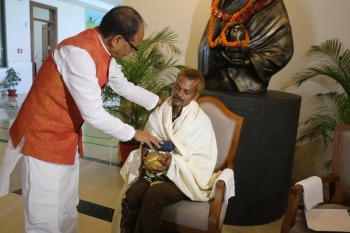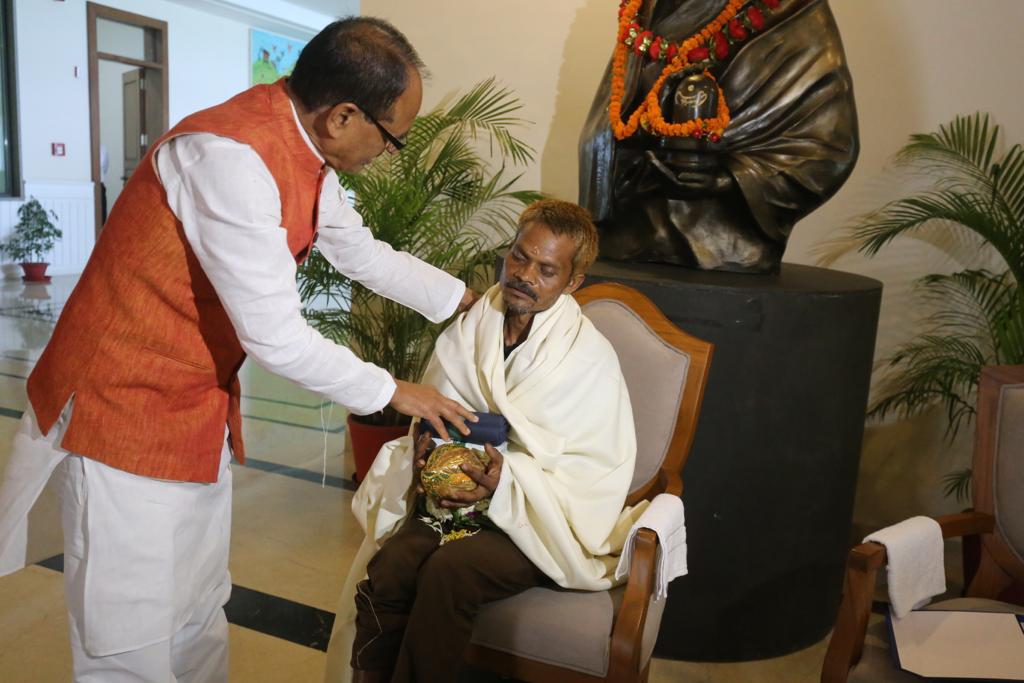
.png) Jaswant Kaur
Jaswant Kaur

A video has gone viral. A man is seen smoking a cigarette and urinating on a tribal youth, who is silently bearing the abuse he is subjected to. Those who saw the video could not believe that a man would go to such a low extent. That too in a country like India, where the Constitution promotes equal rights for all irrespective of caste, community and economic disparities.
A few media reports have suggested that the victim was threatened and was asked to choose either death or humiliation. The tribal youth chose the latter. The incident happened in the Sidhi district of Madhya Pradesh.
A man, Pravesh Shukla, who is alleged to be a member of the Bharatiya Janata Party, committed the crime. Shockingly, Shukla showed no shame or remorse in his action, while deliberately targeting the youth’s eyes and face. In fact, he would have thought that he would go scot-free.
When he noticed that his video had gone viral on social media, he forced the youth to sign an affidavit, denying the occurrence of any such incident. Traumatised as the youth would have been, he signed the document. The opposition sprang into action and demanded the arrest of Shukla. Not only this, many also wanted his house to be bulldozed.
The BSP supremo, Mayawati, also took to twitter to say, “In this regard, the BJP government of Madhya Pradesh should take action against that criminal not only by NSA but by confiscating/demolishing his property, leaving aside the idea of saving the criminal and not telling him that he belongs to their party. Such incidents bring shame to everyone. "
Meanwhile, the Chief Minister, Shivraj Singh Chouhan, ordered Shukla’s arrest under one of the strictest laws – the National Security Act. A case was registered under Section 294 (obscene acts and songs) and 504 (intentional insult with the intent to provoke breach of peace) of the Indian Penal Code. Not only this, he has also been charged under the Scheduled Castes and Scheduled Tribes (Prevention of Atrocities) Act -- a law meant to protect historically oppressed communities.
Despite the fact that Shukla was arrested, irrespective of his political connections, he displayed a “nonchalant attitude". It all meant that he would be given a free hand and his arrest was a mere sham. However, that was not to be, in view of the upcoming elections.
Madhya Pradesh has 1.53 crore tribal population, accounting for 21.10 percent of the state's population of 7.2 crore. Of the total 230 Assembly seats, 47 are reserved for Scheduled Tribes and 35 for Scheduled Castes. Clearly, the government cannot afford to antagonise its vote bank, especially at a time when they are already upset with the Centre’s inaction in Manipur. The government is also keen on mooting the Uniform Civil Code (UCC), which the tribals believe will be against their culture and tradition.
In an act of damage control, the Chief minister invited the victim to his house, apologised and washed his feet in a sign of penance. “For me, the poor are God and people are like God to me. Serving the people is equal to worshipping God. We believe that God resides in every human being. I was pained by the inhuman incident that happened… respect and security is important for the poor,” he said.
This may appear to be an act to appease the tribals with a larger motive of projecting the BJP as a “messiah” of the marginalised and the downtrodden. However, the government should have allowed the law to take its own course after Shukla’s arrest. What followed after Shukla’s arrest is even more horrifying. The police, on the pretext of illegal construction, bulldozed a major portion of his house, where his parents were staying. Now what wrong has his parents done? Why should they be made to suffer?
These incidents do not show the world’s largest democracy in a good light. This incident should not be viewed in isolation. Of late, we have been witnessing several incidents, where minority rights are being violated with impunity.
If God resides in every human being, to quote the statement given by the Chief Minister, why should people facing similar circumstances be treated differently? Why should people following a particular faith be given an upper hand over another? It is true that the Indian Constitution gives a right to every citizen to profess and practice his/her faith. But it does not allow people of a particular religion to overrule others.
It would have been distressing for us as a country when last year, the UN member states urged India to take a tougher stand on sexual violence and religious discrimination during a universal periodic review at the United Nations Human Rights Council (UNHRC). We were asked to reduce the broad application of “anti-terror” law. In other words, the world is watching us closely.
“We recommend that India reduce the broad application of the Unlawful Activities (Prevention) Act and similar laws against human rights activists, journalists and religious minorities,” said Michele Taylor, the US ambassador to the council.
She further stated: “Despite legal protections, discrimination and violence based on gender and religious affiliation persist. The application of anti-terror legislation has led to prolonged detentions of human rights defenders and activists.”
Not only this, questions were raised on the way access to the Internet has been stopped at several instances, more particularly in Kashmir and Manipur, violating freedom of speech and ex
However, it is time to take a step back, reflect and introspect on our actions. Are we really committed to what we have been preaching as a country for the last 75 years? Are we really practicing what our forefathers taught us, especially the principle of non-violence?
For a government, which has tried to reinstate a few values like Swachhta taught by Mahatma Gandhi, it is important to reflect what Swachhta actually means? Does it only mean to start a cleanliness drive? Or, it actually means to lead with a Swachh mind as well? Are we really following these principles in letter and spirit? Clearly No.
The law of the land and the values our Constitution promoted over the last 75 years should take precedence over any kind of political affiliation or social and economic stature. The Bulldozer Raj should not take over our senses and sanity. Not all people can be pacified with the appeasement politics that is being played for winning elections. After all, yeh jo public hai sab jaanti hai, as an old Hindi Bollywood song goes.